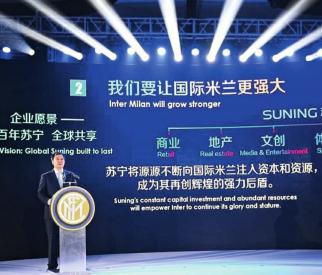Economy
Suning Scores Majority Stake in Inter Milan Soccer Team
Xinhua News Agency reports that Chinas retail giant Suning Group announced in early June that Suning Sports, a newly established company under the Suning Group, has acquired a 70 percent stake in Italian football club Inter Milan, a deal worth 270 million. Suning Group, based in Chinas eastern city of Nanjing, is one of the top retail companies in China, with more than 1,600 retail outlets across the country, as well as its e-commerce platform Suning.com. Its operation categories include home appliances, general merchandise, household commodities, books, and service merchandise.
Founded in 1908, Inter Milan has won 18 domestic titles and three UEFA Champions league trophies. As the first European club to visit China over 30 years ago, Inter Milan has paid great attention to the Chinese market. Sunings acquisition at this time is expected to help the club take better root in China –the worlds largest football fan market.
Sunings acquisition of Inter Milan marks an important step in Sunings going-global ambitions. In early 2016, Suning announced the launch of a new round of development to tap the international market. Besides Japan and the U.S., where it already has a presence, Suning will soon enter the Southeast Asia and European markets. The acquisition of Inter Milan at this time will help it gain a reputation in Europe and the whole world.
China & Turkey to Build E-commerce Platform
China signed an agreement with Turkey in early June at the 4th China (Beijing) International Fair for Trade in Services (CIFTIS) to jointly build a multilingual cross-border e-commerce platform. Businesses from the two sides will invest RMB 500 million (about US $76 million) in the platform to develop an online trading system and build offline business bases.
A system in which people can use Chinese, English, Turkish, and Uygur – major languages along the proposed Silk Road Economic Belt – has been developed for tranding purposes. A translation software has also been embedded, which supports real-time translation in 28 languages.
Luan Lixin, chairman of Xinjiangs Erdaoqiao Cultural Tourism Group Co., Ltd., said that physical stores covering 38,000 square meters at the International Grand Bazaar in Urumqi, capital of Xinjiang Uygur Autonomous Region, will provide and update commodity information for the platform.
According to the agreement, the platform will be promoted in about 100 key cities along the Silk Road Economic Belt over the next two years.
Chinas Drone Market Will Hit US$11 Billion by 2025
Chinas robust drone industry is likely to see its market value swell to RMB 75 billion (about US $11.5 billion) by 2025, said a research report by the consultancy iResearch.
At the end of 2025, unmanned aerial vehicles will be applied largely for aerial photo shooting, farm chemical spraying and forest protection, as well as security services, according to the report.
The report calculates that the nations civilian drone market has grown by more than 50 percent over the past years, with its product portfolio becoming increasingly diversified. The Shenzhen-based technology firm DJI, a leading manufacturer of commercial and recreational drones, accounts for almost 70 percent of the market share worldwide, with Europe and North America as its biggest customers.
The report also outlined several uncertainties and challenges facing the industry, including inadequate regulation on low-altitude flying zones in China and narrow drone applications. Moreover, technologies still need to be updated to make drone products more durable and reliable.
Chinese Online Consumption Soars over the Past Five Years
Online consumption, especially services-related, saw a surge in the past five years, according to a report jointly released at the end of May by the China Academy of New Supplyside Economics and Ant Financial, the financial arm of the Alibaba Group, based on data collected from 21 industries and 337 cities in China.
The report shows that online consumption surged, increasing more than 12.1-fold from January 2011 to April 2016. Data also indicate that growing numbers of people have been buying more online.
This year, the value of servicesrelated online consumption accounts for 25 percent of the total, up from 4.3 percent in 2011, according to the report. The scale of services-related online consumption has soared 70-fold in the past five years. Some sectors, including catering, air travel, education, and lifestyle services, have witnessed tremendous business growth. Beijing, Shanghai and the provinces of Zhejiang, Jiangsu and Guangdong top the list in terms of expenditure on such items as cosmetics, jewelry and sports and entertainments.
The report also shows that last year, 63 percent of new online consumers came from third- and fourth-tier cities, rising from 55 percent in 2011, because of improved transportation conditions and the popularization of online payment. Remote regions such as Hainan and Tibet also made it onto the list of the top 10 online spenders, denoting that Internet technology has shortened the distance between “supply” and“demand.”

